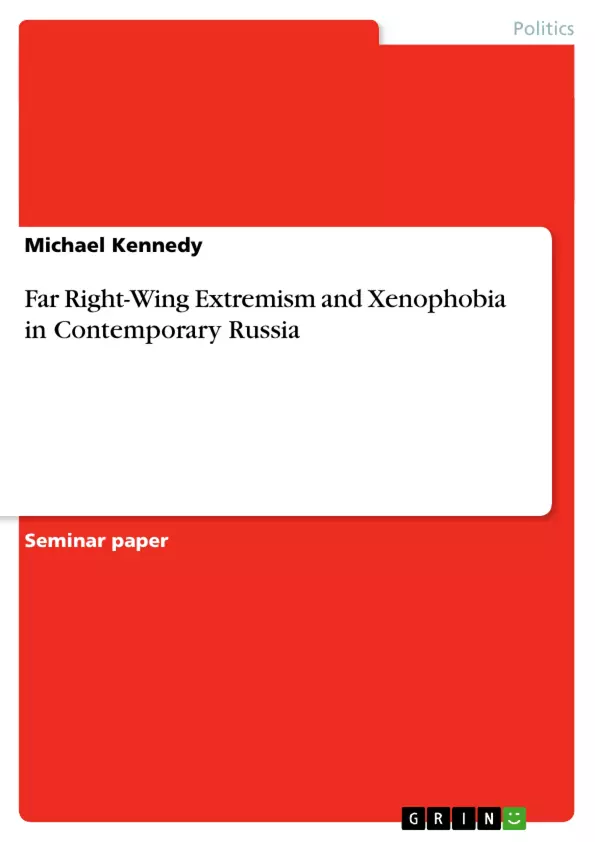Since the collapse of the Soviet Union, the Russian Federation has witnessed a marked and progressive increase of extreme right-wing ideology, which has led to violent interethnic clashes, terrorism, outspoken government officials calling for neo-imperialist expansion, and as some would argue – war. Along with Russia’s relative prosperity and stability following Vladimir Putin’s rise to power at the turn of the century, Putin has gained strong widespread support and will surely be re-elected in March 2012. However, the Russian government under Putin has indirectly allowed for the evolution of an extreme right-wing movement through its policies and lack of action toward preventing attacks. Nevertheless, it is generally accepted that Putin is not responsible for creating or orchestrating a movement that has in many cases been responsible for lethal violence.
It was in 2004 that the Russian Federation experienced the most dramatic increase in militant hate crimes on non-Russian ethnic groups with 215 people injured and 49 killed. Following this, 414 were injured and 47 killed in 2005, and 485 injured and 54 killed in 2006 (Varga, 2008). These findings demonstrate the rapid growth in support of such hate groups, or at least the frequency of attacks and demonstrations. This suggests that the continued rise of xenophobic hate crimes is not likely to lose momentum. The factors that have played a part in developing the spread of far right ideology include political parties, radical individuals within government, and nationalist groups and associations.
Inhaltsverzeichnis (Table of Contents)
- Far Right-Wing Extremism and Xenophobia in Contemporary Russia
- The Emergence of Far Right-Wing Extremism in Russia
- The Role of the Putin Administration
- Political Parties and Far Right-Wing Extremism
- The Role of the Media
- The Impact of Far Right-Wing Extremism on Russian Society
Zielsetzung und Themenschwerpunkte (Objectives and Key Themes)
This paper examines the rise of far right-wing extremism in Russia since the collapse of the Soviet Union. It explores the causes of this phenomenon, the groups responsible for its spread, and the impact it has had on Russian society.- The influence of political parties, individuals within government, and nationalist groups on the rise of far right-wing ideology in Russia.
- The role of the Putin administration in both combating and supporting far right-wing ambitions.
- The impact of Russian xenophobia on ethnic minorities, particularly in the Far East.
- The relationship between Russia and China and its role in fueling anti-Chinese sentiment in Russia.
- The prevalence of far right-wing ideology among Russian citizens, particularly following the Chechen wars and the influx of migrants from the Caucasus and Central Asia.
Zusammenfassung der Kapitel (Chapter Summaries)
This paper begins by outlining the historical context of far right-wing extremism in Russia, highlighting the role of political parties, nationalist groups, and individuals within government in promoting this ideology. It then examines the impact of Putin's administration on the development of far right-wing extremism, exploring both the government's efforts to combat this phenomenon and its inadvertent contribution to its growth.
The paper also delves into the specific case of Russian xenophobia in the Far East, exploring the historical and contemporary factors that have contributed to the rise of anti-Chinese sentiment in this region. The paper then examines the role of the media in perpetuating and exaggerating these sentiments.
Finally, the paper analyzes the impact of far right-wing extremism on Russian society, considering the consequences of this ideology for ethnic minorities, the political climate, and the overall social fabric of the country.
Schlüsselwörter (Keywords)
This paper focuses on the themes of Russian xenophobia, far right-wing extremism, nationalism, political parties, the Putin administration, ethnic minorities, the Caucasus, Central Asia, the Far East, China, and the media. It examines the impact of these factors on Russian society and the development of Russian politics since the collapse of the Soviet Union.Frequently Asked Questions
What are the main causes of far right-wing extremism in contemporary Russia?
The rise is attributed to the collapse of the Soviet Union, economic instability, nationalist groups, and political rhetoric that fuels neo-imperialist expansion and anti-migrant sentiments.
How has the Putin administration influenced xenophobia?
While not directly creating the movement, the government has indirectly allowed its evolution through specific policies and a lack of decisive action against hate crimes and militant groups.
Which ethnic groups are most targeted by Russian far-right groups?
Targets primarily include non-Russian ethnic groups from the Caucasus, Central Asia, and increasingly anti-Chinese sentiment in the Far East.
What role does the media play in Russian nationalism?
The media often perpetuates and exaggerates xenophobic sentiments, contributing to a social climate where far-right ideologies can gain widespread support.
How did hate crime statistics change in the mid-2000s?
There was a dramatic increase between 2004 and 2006, with injuries rising from 215 to 485 annually, signaling a rapid growth in militant hate group activities.
- Citation du texte
- Michael Kennedy (Auteur), 2013, Far Right-Wing Extremism and Xenophobia in Contemporary Russia, Munich, GRIN Verlag, https://www.grin.com/document/268266



